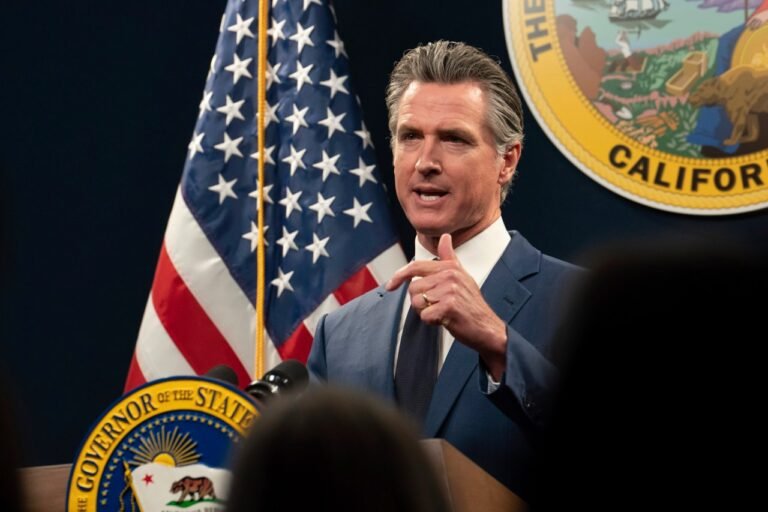Adam Beam, The Associated Press
38 minutes ago

FILE – California Gov. Gavin Newsom answers reporters’ questions about proposed amendments to the state budget for fiscal year 2024-25 during a news conference in Sacramento, Calif., Friday, May 10, 2024. On Saturday, June 22, Newsom and legislative leaders announced they had reached an agreement to eliminate an estimated $46.8 billion budget deficit. (AP Photo/Rich Pedroncelli, File)
SACRAMENTO, Calif. (AP) — California Democrats have agreed to postpone a minimum wage increase for about 426,000 health care workers in an effort to balance the state’s budget.
The agreement by Gov. Gavin Newsom and legislative leaders is part of a larger plan to eliminate an estimated $46.8 billion deficit, marking the second consecutive year that the nation’s most populous state has run a multibillion-dollar deficit.
Health care workers’ hourly wages were set to increase on July 1 as part of a plan to gradually raise the pay to $25 an hour over the next decade. If approved by the state Legislature next week, the raise could come into effect on Oct. 15, but only if Californians’ earnings from July through September are at least 3% higher than officials estimate.
If that doesn’t happen, the pay increases wouldn’t begin until Jan. 1 at the earliest.
The delay protects a hard-won victory for one of the state’s largest labor unions and one of the Democratic Party’s biggest campaign donors. Dave Regan, president of the Service Employees International Union-Western Coalition of Healthcare Workers, said workers are disappointed that they won’t get a pay raise this summer.
“But we recognize and appreciate that legislative leaders and the Governor listened to us when we mobilized and spoke out this year to address California’s patient care and health care worker crisis, despite our historic budget deficit,” he said in a statement.
Most Californians make a minimum wage of $16 an hour, already one of the highest in the U.S. Most fast-food workers in the state make a minimum wage of $20 an hour, a rate that began rising in April with ripple effects across the state.
But raising wages for health care workers is more difficult because of the budget implications: California both employs health care workers and pays for their health care benefits through the state’s Medicaid program.
The Newsom administration had previously said the minimum wage increase would cost the state about $2 billion, but delaying it until January would cost the general fund about $600 million — a figure that would increase each year to reflect the scheduled increases until the minimum wage for most health care workers reaches $25 an hour.
California’s revenues have been declining for most of the past two years but have been recovering recently.
“We are confident that the first pay increases will be implemented in the fall for workers who have not yet received a pay increase,” Regan said.
The budget agreement authorizes spending totaling $297.9 billion for the next fiscal year, which begins July 1. Governor Newsom and legislative leaders agreed to $16 billion in cuts, including $110 million to a program that helps middle-class students pay for college tuition and $1.1 billion to various affordable housing programs.
But Governor Newsom and lawmakers agreed to abandon some previously proposed cuts, including halting payments to caregivers of low-income, disabled immigrants on Medicaid.
Lawmakers agreed to lend $400 million to utility Pacific Gas & Electric Co. to extend the life of the state’s only remaining nuclear plant, but some lawmakers opposed the move, fearing it might not be repaid.
Newsom also agreed to increase how much the state’s Medicaid program pays doctors for treating patients, though the amount is far less than what the governor previously agreed to spend. Meanwhile, doctors have qualified to put a measure on the November ballot that would require the state to pay them more for treating Medicaid patients.
In addition to roughly 8% cuts across state agencies, the agreement also includes an additional $350 million in cuts to state prisons and a one-time tax increase on businesses with taxable income over $1 million, starting this year and running through 2026.
“This agreement puts the state on a path to long-term fiscal stability, addressing our current budget deficit and strengthening our budget resiliency in the future,” Newsom said.
Lawmakers are expected to vote on the budget next week. Republicans, who do not have enough seats to influence the bill, say they have been left out of negotiations.
Senate President pro tempore Mike McGuire said this was a “challenging budget year,” but elected officials were able to “reduce shortfalls, protect progress and maintain responsible reserves.”
Democratic State Assembly Speaker Robert Rivas said the Legislature “fought hard to protect the public services that matter most to Californians.”


